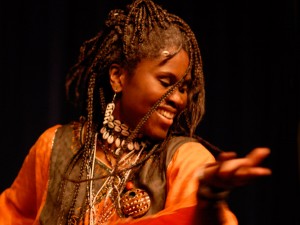 On October 19th, I attended a conference at UBC called Pursuing Impact: A Symposium on International Development. The conference brought together both students and experienced workers in the field of international economic development. Some of the fundamental questions addressed by the conference were about the nature of “impact” in development work. Whose definitions of impact are we using? Who is involved, and who isn’t? What happens when we discover we are having a negative impact, or when the impact on ourselves may be greater than the impact on the people we are working with?
On October 19th, I attended a conference at UBC called Pursuing Impact: A Symposium on International Development. The conference brought together both students and experienced workers in the field of international economic development. Some of the fundamental questions addressed by the conference were about the nature of “impact” in development work. Whose definitions of impact are we using? Who is involved, and who isn’t? What happens when we discover we are having a negative impact, or when the impact on ourselves may be greater than the impact on the people we are working with?
The conference opened with an address from Elder Larry Grant from the Musqueam First Nation, welcoming attendees to his Nation’s territory, which UBC stands on. He spoke to us briefly in the henqeminem language he grew up speaking. Elder Grant talked about how he viewed development in Vancouver as “international” in nature, as all those driving it, Canadian or not, are not members of the indigenous nations which lived here originally.
An opening panel followed, on which several speakers discussed the 8 Istanbul principles, created in order to create a more effective development planning model, and how they played a role in projects which each of them worked on. These principles address the roles which democratic participation, accountability, learning, and partnership play in the development process. Speaking personally, the speaker on this panel I found most interesting was Sister Maudilia Lopez Cardona, a nun and indigenous Mayam Mam woman from San Miguel Ixtahuacan. Her community has been struck hard by the advances which mining companies have made into the area: specifically, the Goldcorp Marlin Mine. Conflicts have become so bad that several people have been killed, including a young father and a teacher who was a community activist. Working with her parish, Sister Cardona has been combating these abuses and has even traveled to Ottawa to deliver an official complaint. This is just one example of the free reign and lack of accountability which Canadian mining companies have had internationally.
There were a variety of breakout sessions throughout the day. Here are the ones I attended:
Learning on the Fly was a talk given by Courtney Loftus, a UBC student who had taken her first field work trip to Swaziland with Sauder. Swaziland has a 40% unemployment and 1/3 of the population is HIV positive. Courtney worked with the organization SOS, and the Siteki Children’s village. She talked about her discovery that short term benefits, ironically offered by another NGO, could undermine long-term focusing ones by drawing away local participants. Most of all, she focused on what pressures young people starting out in the development field can undergo as they begin project work, particularly in terms of culture shock and self-doubt. She encouraged first-timers to focus large instead of doing less than they could be, to be self disciplined and take initiative, and finally to ask for advice and build the trust-based relationships which are vital in the development field. She warned again spreading oneself to thin, and against waiting for work rather than finding it. I found this lecture very helpful, especially in a field where the praise seems to go to those who make their work their entire life, and where it can sometimes be considered selfish to take time for ones’ personal affairs, like family or even relaxation. As someone who has looked into the development field a lot more recently than a lot of my associates, I found this to be an open and honest account of the troubles young people can face and what to be prepared for.
Challenges Experienced While Working to Create Impact and New Businesses in Kenyan Slums has a rather self explanatory title. The session was led by students who had participated in the Sauder Africa Initiative and had gone to Nairobi to assist entrepreneurs whose work takes place in extra-legal markets based outside the city itself, in the poorer neighbourhoods and slums. One of the things discussed in this workshop was that many of these entrepreneurs want nothing more than to work in a company in a legal market, with a steady income flow. I have studied these markets before in my Wealth and Poverty of Nations course (ECON 234 – take it). The fact is that there are hidden costs associated with these markets – bribes, inability to grow, difficulty of storage, and so on – which makes the legal markets more desirable, taxes and all. The discussion turned into a project analysis, with students suggesting what might have caused some of the existing shortfalls, such as a lack of continuity when new practices were taught and introduced. A large part of the group came to the conclusion that the summer-only nature of the program was a primary cause and that Sauder might be better suited to assisting and consulting roles with already existing projects – Nairobi is chock full of NGO’s, after all.
Business as Usual was presented by four SAI participants who had visited the township area of Phalaborwa, South Africa. As much of my family comes from and lives in the country, I was excited to see what experiences the students had had in this rural region of the “new South Africa”. The town was built around a mine, which employed the vast majority of people in the area. The Phalaborwa Mine had a social arm, called the Phalaborwa Foundation, which played a major role in providing education, skills training, and other social aid in the town and surrounding communities. Because of the laws instituted by the ANC government following the fall of Apartheid, the mine was mandated to give 3% of its revenue to community development, which meant that the Foundation was able to fund these projects with relative ease. The colonial mindset was an important issue in the discussion, especially since students were there to try and assist the community. The lack of continuity between projects was yet again an obstacle in creating lasting change, even with things as small as using excel instead of paper and pencil to do spreadsheet calculations. The discussion then began to focus on the quandary of many students coming away with more benefits than were given to the community by their projects, such as career focus, experience, and so on. The question is: is it ethical to leave a community having benefits more than they did? Is that colonialism, or at least using other people’s needs to benefit yourself? For my part, I wondered about the principle put forth by the economist Vilfredo Pareto, who stated that if a person or group has any tangible benefits, or even experiences no change, from an experience, then the fact that another group or individual may have benefited more does not matter. When the alternative is that the community might be left with nothing at all, there seems to be a certain logic to this argument: after all, if a person helped you in a way let you earn a million dollars a year, would you care if he earned 50 million from it? This was for me the most interesting of the conferences, due to my personal connection to the country and the issues raised in it.
The closing was given by the African dancer Jacky Essombe, who comes from Cameroon but grew up in Paris. She offered the perspective of the African experience when it comes to Western aid and development. She described it as being one of admiration of the West, but to an extent one of idolization. That is to say, Africans working with development groups and NGO’s will sometimes take advice even when it may not fit their needs; the assumption is, so to speak, that “the West knows best.” I found this to be a particularly startling revelation, as I have always focused in my goals going into this field on being “partners, not benefactors.” Being a European who grew up in Canada, I would like nothing more than to overcome the mindset and history of colonialism through a mutual overcoming. Apologies may make us all feel nice inside, but in the end they don’t do a thing for the person in Sierra Leonne or the DRC who is suffering from a paramount Chief system instilled by the British or a play-off between tribes which benefited first colonial powers, then the tyrants who followed them. As Essombe danced following her closing statements (and had us do so with her), this was one of the chief issues on my mind. The relations between this, mass immigration, and the perspectives and goals of development is one I intend to pursue in future.
Walking home afterwards, I felt that this conference was extremely helpful in giving me focus in a field which I have found, to say the least, daunting as a relative newcomer. I have a better picture now of what to expect as I move further in my studies and work, and also a better perspective on how I want to approach things. I encourage anyone who is just starting to become interested in this field to attend a few of these conferences and learn from the experiences of others. A textbook is, after all, no substitute for experience, and it’s by building on the experiences of others that we make true progress and without which real impact is nigh impossible.


 Follow
Follow